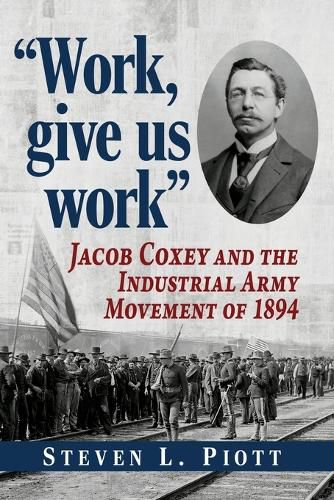Readings Newsletter
Become a Readings Member to make your shopping experience even easier.
Sign in or sign up for free!
You’re not far away from qualifying for FREE standard shipping within Australia
You’ve qualified for FREE standard shipping within Australia
The cart is loading…






This title is printed to order. This book may have been self-published. If so, we cannot guarantee the quality of the content. In the main most books will have gone through the editing process however some may not. We therefore suggest that you be aware of this before ordering this book. If in doubt check either the author or publisher’s details as we are unable to accept any returns unless they are faulty. Please contact us if you have any questions.
The depression that began in 1893 caused widespread economic suffering throughout the country and triggered a march of unemployed men from Massillon, Ohio, to Washington, D.C. Known in the press as ""Coxey's Army""--led, ironically, by successful businessman Jacob Coxey--the marchers demanded that the federal government create jobs for idled workers. But Coxey's march overshadowed a much larger story. In late March 1894, other ""armies"" of the unemployed mobilized on the Pacific Coast and in the Rocky Mountain states to begin their own pilgrimages to the nation's capital. Confronted with distances farther than those covered by European crusaders to the Holy Land, western marchers had to improvise. When railroads refused them or demanded full fare that they didn't have, they commandeered trains. Sometimes they built boats to continue their journeys on one of the major rivers. Alarmed by the possibility of 100,000 unemployed workers converging on the nation's capital, railroad and government officials did everything they could to stop them. This exhaustively researched history tells the story of these dogged marchers who only wanted to work.
$9.00 standard shipping within Australia
FREE standard shipping within Australia for orders over $100.00
Express & International shipping calculated at checkout
Stock availability can be subject to change without notice. We recommend calling the shop or contacting our online team to check availability of low stock items. Please see our Shopping Online page for more details.
This title is printed to order. This book may have been self-published. If so, we cannot guarantee the quality of the content. In the main most books will have gone through the editing process however some may not. We therefore suggest that you be aware of this before ordering this book. If in doubt check either the author or publisher’s details as we are unable to accept any returns unless they are faulty. Please contact us if you have any questions.
The depression that began in 1893 caused widespread economic suffering throughout the country and triggered a march of unemployed men from Massillon, Ohio, to Washington, D.C. Known in the press as ""Coxey's Army""--led, ironically, by successful businessman Jacob Coxey--the marchers demanded that the federal government create jobs for idled workers. But Coxey's march overshadowed a much larger story. In late March 1894, other ""armies"" of the unemployed mobilized on the Pacific Coast and in the Rocky Mountain states to begin their own pilgrimages to the nation's capital. Confronted with distances farther than those covered by European crusaders to the Holy Land, western marchers had to improvise. When railroads refused them or demanded full fare that they didn't have, they commandeered trains. Sometimes they built boats to continue their journeys on one of the major rivers. Alarmed by the possibility of 100,000 unemployed workers converging on the nation's capital, railroad and government officials did everything they could to stop them. This exhaustively researched history tells the story of these dogged marchers who only wanted to work.